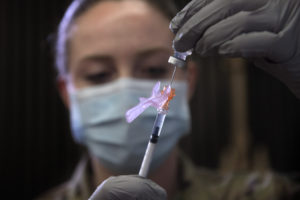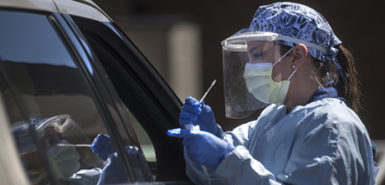
A record surge in COVID-19 cases has prompted health teams to sound the red alert.
The spike in cases has been especially pernicious in Michigan. And this time, patients are increasingly younger and otherwise healthy.
“Michigan has the inauspicious note of being essentially the worst state in the country of cases per 100,000, which is not a place we want to be,” Spectrum Health West Michigan President Darryl Elmouchi, MD, said.
“This does feel a bit like we’re all on a war footing, when we look at our volumes and what we’ve seen over the last 12 months,” he said.
Inpatient and outpatient facilities are seeing a record volume of COVID-19 cases, a trend that started in late August and continues to tick upward every day.
“We’ve been in this surge, really, it seems like forever,” Dr. Elmouchi said. “If you look back, it was mid to late summer when our command center was green. The whole country thought maybe we were going to be OK, and lo and behold, here we find ourselves.”
By early November, COVID-19 cases had skyrocketed. By late November, the average percent positivity rate stood at 24.1%.
“That is really unprecedented and quite frightening,” Dr. Elmouchi said.
There’s no quick fix, but there is reason for optimism: vaccinations.
Of the more than 400 people currently being treated for COVID-19 at Spectrum Health hospitals, 91% are unvaccinated. Those who are vaccinated are typically older and battling other illnesses as well, Dr. Elmouchi said.
“The vaccines absolutely 100% continue to work,” he said.
Spectrum Health infectious disease specialists Russ Lampen, DO, and Liam Sullivan, DO, answered questions and addressed some myths about the vaccine.
Q: What is the availability and effectiveness of vaccines right now?
There are currently three COVID-19 vaccines available: the Moderna vaccine, the Pfizer vaccine and the Johnson & Johnson vaccine.
The Moderna and Pfizer vaccines use messenger RNA technology, while Johnson & Johnson uses a different technology that achieves a similar effect, Dr. Sullivan said.
The Pfizer vaccine is fully FDA-approved for adults ages 18 and up and also has emergency use approval for ages 5 through 17. The Moderna vaccine is available under emergency use authorization for adults and is pending full FDA approval.
“All three deliver information to our immune system in the form of a spike protein, which is the major target of a coronavirus,” Dr. Sullivan said. “It delivers it to cells in our immune system, and our immune system learns from the spike proteins and makes an immune response to it.
“So when a person is exposed to COVID-19, instead of their immune system being completely naïve to it, they have instructions on how to respond to it and their body can better defend itself.”
The CDC has also provided extensive resources about the effectiveness of the vaccines.
Q: What is the difference in outcomes for vaccinated versus unvaccinated?
An unvaccinated person is 15 more times likely to be hospitalized with COVID-19 than a vaccinated person, Dr. Sullivan said. An unvaccinated person is also six times more likely to catch COVID-19.
“To say these vaccines have had a remarkable alteration on the pandemic would be an understatement,” Dr. Sullivan said. “Yes, people with the vaccine could still get infected. But by and large they are not getting hospitalized.
“If we didn’t have these vaccines available right now, it would be unimaginable how this pandemic would be going right now,” he said. “We would be completely overwhelmed.”
Q: Are there concerns about how fast the vaccines were developed?
It may seem the vaccines were developed quickly, but researchers have been exploring this type of vaccine technology for the past three decades.
Research from previous pandemics helped guide the research into COVID-19 vaccine technology, Dr. Sullivan said.
“When the (COVID-19) pandemic came about, they went back and looked at all of that research—and all that research proved to be absolutely critical to developing these vaccines,” Dr. Sullivan said. “And I think it’s safe to say if we hadn’t had any of that research done on those two viruses, we probably wouldn’t have these vaccines today.”
Q: Any concerns about possible long-term effects from the vaccines?
Vaccine research is typically done over a period of several years, allowing researchers to determine how long a vaccinated individual’s immune response will help protect them from the disease, Dr. Sullivan said.
As it pertains to COVID-19, time did not allow for a long-term study before providing the vaccine to populations. Doctors wanted to immediately prevent people from getting infected, keep them out of the hospital, and alter the trajectory of the pandemic.
“The original people in clinical trials are still being followed very closely to look at any potential long-term effects from the vaccines,” Dr. Sullivan said.
“If you go back and look at previous vaccine clinical trials that have been done, when vaccines have side effects, they always show up within the first six to eight weeks of vaccination,” he said. “They never see side effects from vaccines after about eight weeks.”
If vaccines get derailed in clinical trials, it’s almost always because of side effects showing up in those first six to eight weeks of being administered, he said.
“The trial recipients on all three of the vaccines available have been followed for at least about 15 to 18 months at this point in time,” Dr. Sullivan said. “There’s been no long-term side effects seen thus far, and it probably will remain that way.”
Q: What about reports of deaths linked to the vaccine?
Some of the rumors circulating about the number of deaths caused by the COVID-19 vaccine come from misinterpretation of the VAERS database, Dr. Lampen said.
The FDA maintains the VAERS network so health care providers and others can report concerns about vaccinated individuals experiencing adverse events.
Currently, close to 250 million Americans have received at least a single dose of some type of COVID-19 vaccination. In that time period, about 9,000 people have later died, Dr. Lampen said.
“It’s not surprising that when we have a vaccine that we’ve largely targeted toward older individuals—and, again, out of a population of nearly 250 million that received vaccines—that you would have some deaths,” he said.
The deaths are then investigated by the FDA, whose researchers are not seeing any association between the vaccine and the cause of these deaths.
“These people are dying from car accidents, heart attacks, cancer, lung disease … but they’re not finding a link between the COVID vaccination and these people’s deaths,” Dr. Lampen said.
The database—a safety mechanism that allows researchers to examine the information—doesn’t mean that the deaths were caused by vaccinations, Dr. Lampen said.
“I think that’s important to look at and important to know,” he said. “People are sort of twisting that data and using it out of context.”
Q: Are there side effects to these vaccines?
There are some possible side effects.
“We see these side effects early,” Dr. Lampen said. “We know that people often get pain or tenderness at the site of injection. People may have low grade fevers, fatigue. That’s very common.”
A more serious reported side effect is anaphylaxis or a severe allergic reaction.
“That typically occurs within 15 to 20 minutes of giving the vaccine,” he said. “That’s one of the reasons people are asked to stick around for a while after they’re given the vaccine, just to observe them.”
It’s an exceedingly rare side effect, he said, happening in about two cases per 1 million vaccines given.
In some instances, those who received the Johnson & Johnson vaccine might also experience thrombocytopenia and thrombosis—low platelets and blood clots, an immunologic phenomenon.
About 15 million doses of Johnson & Johnson vaccine have been administered, and there have been less than 50 such cases, Dr. Lampen said.
There have also been cases involving myocarditis, or irritation of the heart.
“That has primarily occurred in young men, teenage men, who received either Pfizer or Moderna,” Dr. Lampen said.
In the U.S., about 1,000 people experienced this. “Those cases have tended to be very mild and nearly all of them have resolved in relatively short term,” he said.
It’s critical to eye vaccine safety through the lens of the COVID-19 pandemic. The Delta variant has made COVID as contagious as chicken pox, Dr. Lampen said—and before the chicken pox vaccine, nobody escaped childhood without getting chicken pox.
“We are in a similar scenario here,” he said. “We are either going to become vaccinated from COVID, or we’re going to be infected with COVID.”
The rate of complication from COVID infection—death, pneumonia, inflammation of the heart—far exceeds any sort of rare complications associated with vaccines, he said.
Q: Some people have gotten sick or died from COVID-19, even if they’ve been vaccinated. Is that a sign vaccines don’t work?
You have to look at what the vaccines were principally designed for—to keep people out of the hospital and keep them from dying, Dr. Sullivan said.
And the vaccine is achieving that. “If you’re unvaccinated, your risk of hospitalization is 15 times higher than if you are unvaccinated,” Dr. Sullivan said.
Also, it’s not unusual for vaccinated people to catch the disease, he said. The virus can still establish itself in the respiratory tract of the nose or throat—but a vaccinated person will rapidly develop a response to the virus in the first 24 to 48 hours.
Their immune response tamps down the symptoms significantly and avoids what otherwise could have been a severe form of pneumonia or death, and they’ll simply experience an asymptomatic infection or a mild cold, he said.
Unvaccinated people, however, face much higher danger of the virus going into the lungs and causing severe pneumonia or death. Also, those who experience severe illness from COVID-19—even after receiving the vaccine—typically have other underlying conditions.
Q: Are there concerns about the vaccine affecting fertility?
There’s no evidence of any impact on fertility for men or women who have received COVID vaccination, Dr. Lampen said.
More than 170,000 women have received COVID vaccines during their pregnancy and there’s no association with increased rates of birth defects. “It’s an extremely safe vaccine to be given to pregnant individuals,” Dr. Lampen said.
Q: Are influenza cases ever lumped in with COVID-19 case counts? Could they be mixed up?
The numbers are not mixed and matched, Dr. Lampen said. Patients are tested for both influenza and COVID-19 when they come to the hospital. They are separate tests.
“Interestingly, this past year we had zero influenza cases, or very, very few,” Dr. Lampen said. “We are now entering our flu season, in 2021, and it will be interesting to see if we see COVID along with influenza.”
Q: What does a normal flu season look like?
In 2019—the last normal flu season in West Michigan—15 people died of influenza-related complications at Spectrum Health hospitals.
“We’re now at 750 COVID-related deaths,” he said. “The death toll is way higher with what we’re seeing with COVID versus an average flu year.”
Nationwide, about 50,000 people will die in a bad influenza year. In the month of October alone, 50,000 people died of COVID in the U.S., Dr. Lampen said. Nearly 800,000 people in the U.S. have died from COVID since the pandemic began.
“The amount of disease and deaths associated with COVID far exceeds anything we ever saw.”
Q: Is there any chance of getting COVID-19 from the vaccine?
No chance at all. The COVID vaccines are not made from live virus and they do not contain any live virus, Dr. Sullivan said.
“It is absolutely impossible for any of the available vaccines anywhere in the world—in the U.S. or elsewhere—to give you a COVID-19 virus infection,” Dr. Sullivan said. “Their job is to mimic infection to instruct your immune system how to properly defend you against future infection, should your body encounter the virus.”
Q: If I’ve already been infected with COVID-19, should I still get vaccinated?
Yes. Natural immunity confers some protection, but it’s unclear how long the immunity will last.
“(Research is) starting to indicate that natural immunity to this virus only lasts a relatively short period of time, in the neighborhood of perhaps nine to 12 months,” Dr. Sullivan said.
There is great benefit to getting at least one dose of messenger RNA vaccine because it augments your response and gives you a strong immunity to future reinfection, he said.
Q: If I have underlying health conditions or adverse reactions to other vaccines, should I still get the COVID-19 vaccine?
Only those who have had anaphylactic reactions to the first dose of the COVID-19 vaccine should not get subsequent vaccines, Dr. Lampen said.
“Just because you’ve had a bad reaction to other vaccines is not a predictor that you’d develop a bad reaction to the COVID vaccines,” he said.

 /a>
/a>
 /a>
/a>
 /a>
/a>